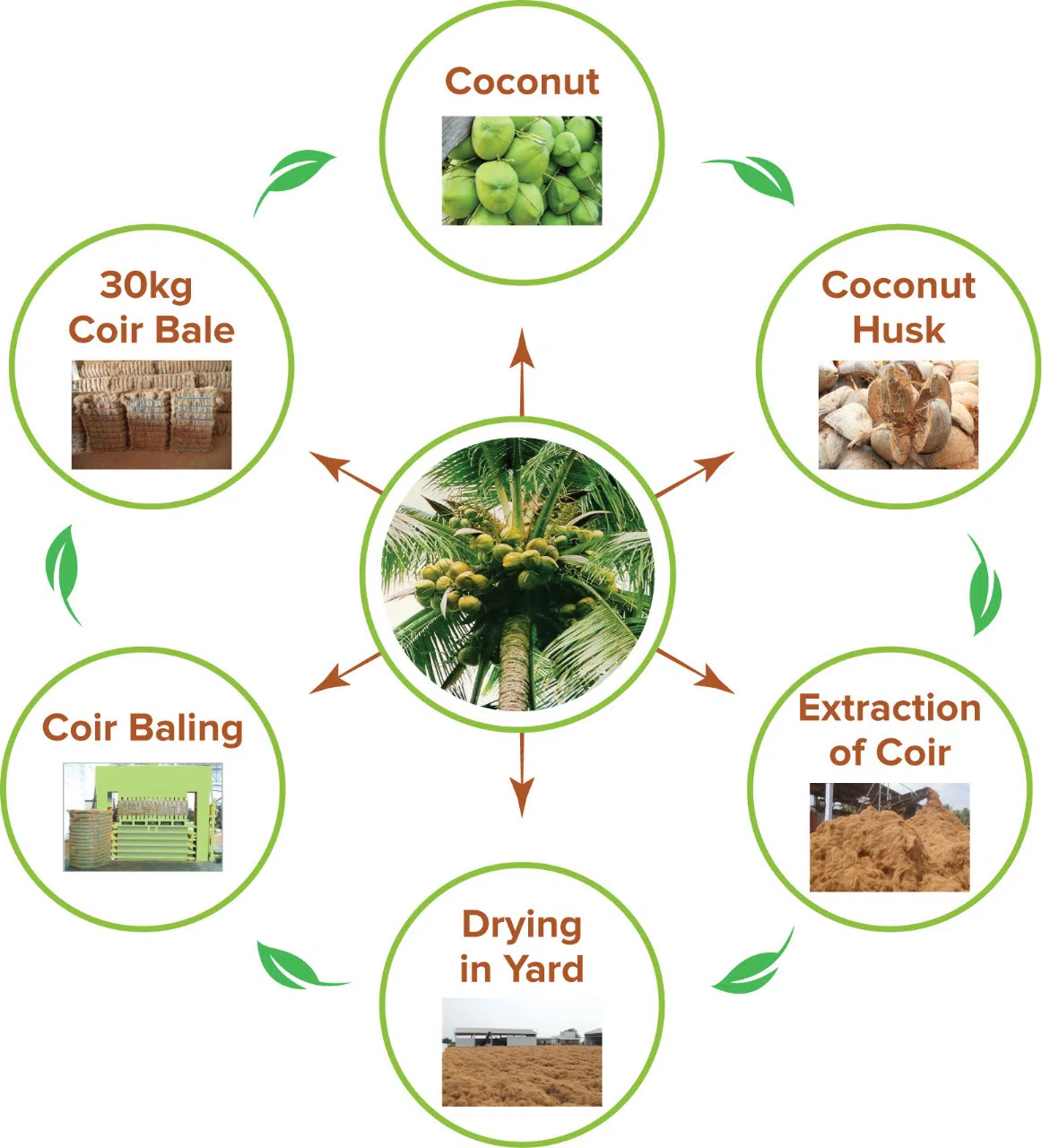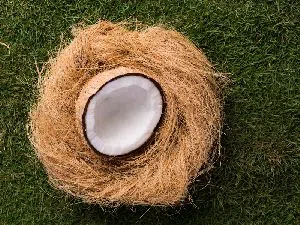Coir, also known as coconut fiber, is a natural fiber extracted from the husk of coconut and used in products such as floor mats, doormats, brushes, and mattresses. Coir is strong and durable, making it an ideal material for products that see a lot of wear and tear. India is the world’s leading producer of coir, with more than 70% of the global supply coming from the country. The main export markets for Indian coir products are the United States, Europe, and the Middle East. With a large domestic market and a growing export market, there is significant potential for businesses to enter the coir industry in India. This article will provide an overview of the opportunities available for businesses in the coir export sector in India.
Did you know that the coir industry in India employs more than 150 lakhs people and has a turnover of ₹4000 crores (US$600 million). The sector is export-oriented, with around 80% of production being exported.
India’s Coir Product Export Industry
The coir export industry in India is one of the country’s most important export industries, with coir products being exported to countries all over the world. India is the world’s largest producer of coir, and the industry employs millions of people. The coir export industry is worth billions of dollars, and it is growing rapidly. The coir export industry is based in Kerala, the world’s largest coir producer. The industry is labor-intensive, and most of the workers are women. The coir export industry employs millions of people, and it is an important source of income for the state of Kerala. The coir export industry is growing rapidly, and the demand for coir products is increasing. The industry is facing some challenges, such as the low price of coir products, but it is expected to continue to grow in the future.
Also Read: How to Become Import Export Business Agent/Broker In India : Explained
India’s vast coir resources
India is one of the world’s top producers of coir, a natural fiber made from the husks of coconuts. The country’s huge coastal areas and tropical climate are ideal for growing coconuts, and India has an estimated 35 lakhs (8.6 million acres) of land under coconut cultivation. In 2016-17, India produced around 54 lakhs tonnes of coconuts, of which around 24 lakhs tonnes were used to produce coir.
Most of India’s coir is produced in the southern state of Kerala, which is also the world’s largest producer of fiber. Other major coir-producing states in India include Tamil Nadu, Karnataka, and Andhra Pradesh. The Indian government is supportive of the coir industry and has implemented several initiatives to promote its growth. These include providing financial assistance to coconut growers and coir manufacturers and setting up research and development centers to help improve coir production techniques.
Business opportunities in the coir industry in India
The coir industry in India offers numerous business opportunities for entrepreneurs and investors. The country is the second-largest producer of coconuts in the world, and coir is a by-product of coconut production. India has a large domestic market for coir products, and the export market is also growing. There is a growing demand for eco-friendly and sustainable products, and coir products are seen as a suitable alternative to synthetic products.
The coir industry offers opportunities for businesses of all sizes. There is a need for small-scale businesses that can provide quality coconuts to processors, as well as large-scale businesses that can process coir and manufacture finished products. There is also a demand for businesses that can provide services such as transportation and storage.
Stages in Coir Manufacturing Process
There are several stages in the coir production process, and each offers opportunities for businesses. These include the following:
- Cultivation of coconuts
- Processing coir
- Manufacturing of finished products.
There is a need for businesses that can provide quality coconuts, as well as those that can process coir into fiber and other products. There is also a demand for businesses that can manufacture finished products such as mats, ropes, and upholstery.
The coir industry is growing, and there is a need for businesses that can provide quality products and services. The industry offers opportunities for entrepreneurs and investors who are looking to start or expand a business.
Also Read: List of Import and Export Procedures & Documentation Followed in India
How to Start a Coir Export Business in India?
Starting a coir export business in India can be a lucrative opportunity, as the country is one of the world’s leading producers of natural fiber. Coir, also known as coco peat, is a byproduct of the processing of coconuts. It is used in various applications, including horticulture, construction, and manufacturing.
To start a coir export business in India, you will need to obtain a license from the Export Inspection Council of India (EIC). You will also need to register your company with the Export-Import Bank of India (EIBI) and obtain an export-import code (IEC). Once you have obtained the necessary licenses and registrations, you can start sourcing coir from suppliers in India.
How to Find Potential Suppliers for Coir Export?
To find potential suppliers, you can search online directories. You can also contact the Coir Board of India, which is the nodal agency for the promotion and development of the coir industry in the country. Once you have identified potential suppliers, you will need to negotiate contracts and prices. Once your contracts are in place, you can start exporting coir to your buyers. To ship coir, you will need to obtain an export license from the Department of Commerce.
Benefits of Exporting Coir from India
There are multiple of benefits of exporting coir from India which also includes the following:
- India is the world’s largest producer of coir, with a production of about 1.5 million Tonnes per year. This gives the country a significant competitive advantage in the global market.
- Coir is an environmentally friendly product made from a renewable resource (coconut husks). It is biodegradable and does not contribute to greenhouse gas emissions.
- Coir is a versatile material with a wide range of applications, including in the construction, automotive, and horticultural industries.
- Exporting coir generates valuable foreign exchange for India. In 2017-18, the country earned around ₹4500 crores (US$ 650 million) from coir exports.
- The coir industry employs millions of people in India, particularly in rural areas.
Also Read: How To Choose Best Name For Import Export Company – Things To Consider
Future of India’s coir export industry
The future of India’s coir export industry looks promising. The coir industry is one of the oldest industries in India and is an important part of the country’s economy. Coir is a natural fiber extracted from the outer husk of coconuts. It is used in a variety of products, including mats, mattresses, ropes, and nets. India is the world’s largest producer of coir. The demand for coir products is growing, especially in developed countries. This is due to the growing awareness of the environmental benefits of natural fibers. Coir is 100% biodegradable and is a renewable resource. It is also resistant to mold and mildew, making it an ideal material for a variety of applications.
Conclusion
India is the world’s leading producer of coir products and exports a significant percentage of its production. There is a growing demand for coir products globally, making India an attractive market for investors. Coir products are made from the husks of coconuts and are used in a variety of industries, including construction, manufacturing, and horticulture. There are numerous business opportunities in the coir export industry in India, from manufacturing to trading and exporting. To start a business in this sector, it is important to have a good understanding of the market and the manufacturing process. The Indian government is supportive of the coir industry and has implemented several policies to promote its growth. The government has set up a Coir Board, which provides financial and technical assistance to the industry. It has also implemented a scheme to provide interest-free loans to coir manufacturers and exporters.
Follow Legal Tree for the latest updates, news blogs, and articles related to micro, small and medium enterprises (MSMEs), business tips, income tax, GST, salary, and accounting.








